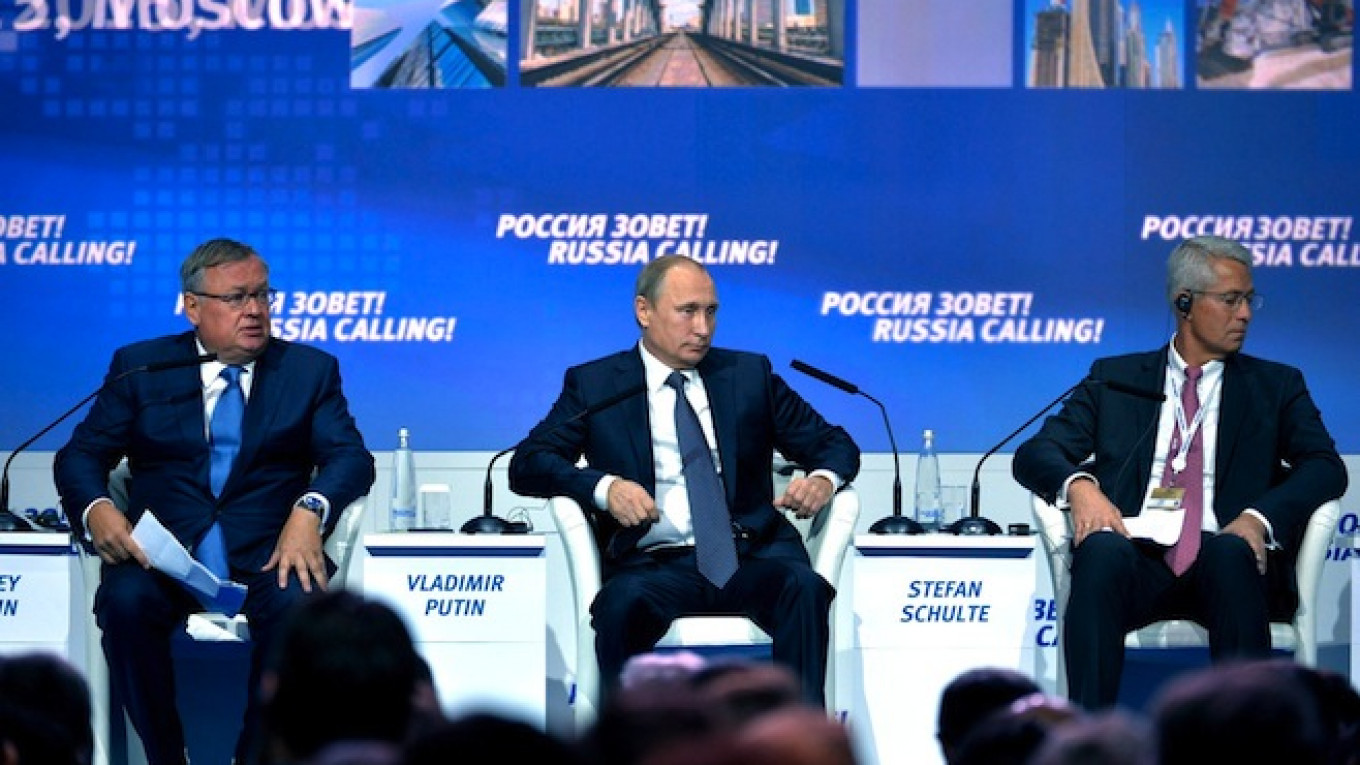President Vladimir Putin on Tuesday strove to deliver a positive message on the economy, even as output continues to shrink.
“We have generally reached the peak of the crisis and overall our economy is gradually adapting to these new economic circumstances,” Putin said during a speech at the VTB Capital “Russia Calling!” international investment forum in Moscow.
The Russian economy has been wrestling since last year with sharp falls in the price of oil, its main export, and Western sanctions over Ukraine.
Despite slumping output across large swathes of the economy, Putin said the situation was stabilizing and showered praise on government and Central Bank officials.
“Our management team in the economy has demonstrated a high degree of responsibility, consistency and the ability to achieve results,” he said, adding that this was a sign of Russia's investment attractiveness.
He reiterated that Russia's economy would remain open, and there would be no capital controls.
Putin pointed to a capital inflow of $5.3 billion in the third quarter — Russia's first quarterly inflow for five years — as proof of the economy's strength. However, according to Central Bank data, more than $400 billion has flooded out of the economy since the last inflow in 2010, and officials expect another net capital outflow in the last quarter of this year.
Putin also used his speech at the forum to sound a soothing note on international issues, at a time when Moscow's support for Ukrainian separatists and intervention in the Syrian civil war have put many countries on edge.
He said Nord Stream II, a planned gas pipeline under the Baltic Sea to Germany, was not aimed at undermining the role of any country in transiting gas to Europe — a reference to Ukraine — and reiterated his commitment to imposing the Minsk peace deal for eastern Ukraine, according to the Reuters news agency.
Meanwhile, he said Russia was not looking to take control in Syria and called Turkey one of Russia's most important partners. Moscow and Ankara have taken opposite sides in the Syrian conflict, where Russian is using air strikes to support President Bashar Assad, and Turkey has protested Russian violations of its airspace.
Putin's bullish outlook on the economy echoed his speech at Russia's last major investment forum in St. Petersburg in May, when he announced, “We have stabilized the situation, absorbed the negative short-term fluctuations, and are now making our way forward confidently through this difficult patch."
But while the initial shock of sanctions and a falling oil price has passed, with Russia staving off a currency collapse or meltdown of the banking system late last year, many economic indicators have worsened in recent months.
The county's economic contraction accelerated from 2.2 percent year-on-year in the first quarter to 4.6 percent in the second, according to official data, with investment, consumer spending and industrial output falling sharply.
The price of oil — Russia's most important export and the source of about 40 percent of budget revenue — has decreased from around $65 per barrel in early summer to about $50.
The Central Bank expects the economy to shrink by 4 percent this year, and contract again in 2016.
Contact the author at p.hobson@imedia.ru
A Message from The Moscow Times:
Dear readers,
We are facing unprecedented challenges. Russia's Prosecutor General's Office has designated The Moscow Times as an "undesirable" organization, criminalizing our work and putting our staff at risk of prosecution. This follows our earlier unjust labeling as a "foreign agent."
These actions are direct attempts to silence independent journalism in Russia. The authorities claim our work "discredits the decisions of the Russian leadership." We see things differently: we strive to provide accurate, unbiased reporting on Russia.
We, the journalists of The Moscow Times, refuse to be silenced. But to continue our work, we need your help.
Your support, no matter how small, makes a world of difference. If you can, please support us monthly starting from just $2. It's quick to set up, and every contribution makes a significant impact.
By supporting The Moscow Times, you're defending open, independent journalism in the face of repression. Thank you for standing with us.
Remind me later.






